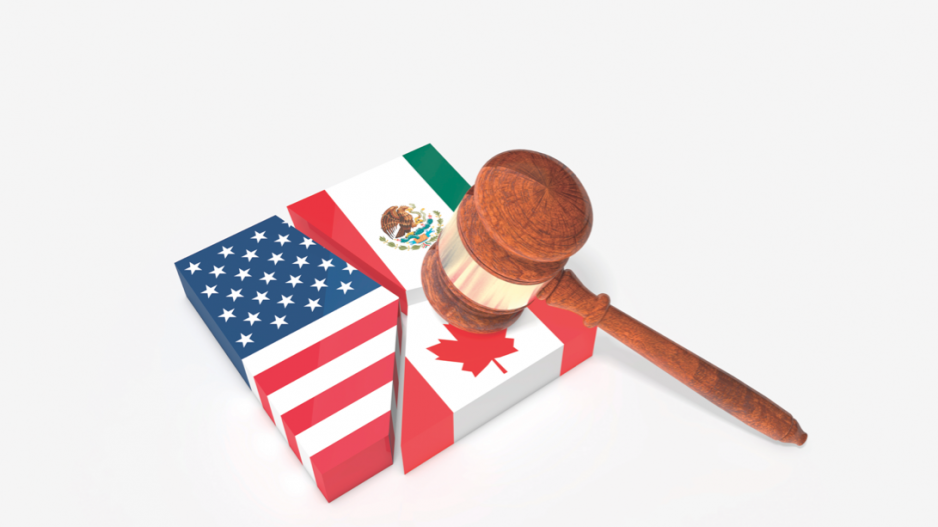The U.S. continues to send mixed signals about the North American Free Trade Agreement’s future.
Last week, a widely circulated report said the Donald Trump administration was anticipating a preliminary trade deal by mid-April. However, before any celebrations could take place north of the border, the U.S. president tweeted that “cash cow NAFTA is in play” in an attempt to use the trade deal as leverage in the U.S.-Mexico border dispute. The tweet again increased NAFTA ncertainty.
In later tweets about North American immigration, Trump referenced Canada when comparing the U.S.’s immigration system to that of its neighbours, raising speculation that immigration policy might be held hostage to the trade negotiations and raising concerns about when and where the NAFTA roller-coaster will end.
There are three possible outcomes to NAFTA renegotiations, said Paul Evans, interim research director for the Institute of Asian Research at the University of British Columbia.
See also: NAFTA's elusive dispute resolution reality for Canada
“Are we going to go to heaven with NAFTA, have an agreement that’s NAFTA 2.0, and we’re all happy? Unlikely. Are we going to go into vampire land where the Americans essentially get a deal that sucks Canada dry?” asked Evans in an interview with Business in Vancouver on Roundhouse Radio. “Or are we going to go into zombie-land with NAFTA, which means nothing happens and we’re going to sit back and wait?”
Bank executives outside of the negotiating room aren’t the only ones concerned about a possible withdrawal. Foreign Affairs Minister Chrystia Freeland has stated that she takes Trump at his word that he will invoke the NAFTA article to withdraw. NAFTA advisory council member and former Conservative leader Rona Ambrose echoed Freeland’s view.
So what happens if Trump pulls out?
Some observers say North American trade could enter a sort of zombie state. The Toronto Stock Exchange and Canadian dollar will likely have a difficult time but business trade will be little affected by the announcement – at least at first.
NAFTA doesn’t just fall apart if Trump triggers the withdrawal clause of the agreement, Article 2205. The withdrawal article requires a participating country to provide six months’ notice before leaving the agreement, and it’s not entirely clear what happens at the end of that time period.
Ultimately, trade authority lies with the U.S. Congress, and any change in U.S. trade laws would need to be approved by the House of Representatives and the Senate. If the U.S. House and Senate don’t support the withdrawal or delay their decision, NAFTA’s rules, tariffs and dispute mechanisms will still be in place despite Trump’s best efforts.
“At this point it looks like the president really hasn’t done the work to really get Congress on board with a potential withdrawal,” said Werner Antweiler, associate professor at the University of British Columbia’s Sauder School of Business. “So if that materializes, we have a zombie state of NAFTA where NAFTA is still on the books in practice even though the withdraw article has been triggered. Physical trade will continue and NAFTA is essentially still in place.”
The outlook for a zombie NAFTA’s effect on stock and foreign exchange markets is less optimistic. On reports that Trump would pull the U.S. out of the trade agreement, the dollar fell 0.8% against the U.S. dollar on January 10 and the S&P/TSX composite index fell 0.44%.
While markets might stumble in the immediate aftermath of a withdrawal trigger, Antweiler said they could rebound once it’s seen that trade hasn’t halted or even changed much. Canadian markets could see something similar to what global markets experienced after the U.K.’s Brexit vote, when the S&P/TSX fell 1.69%. Within less than two weeks, those losses were recovered.
“I think markets will come around, seeing the possibility that there may be some modest changes to NAFTA is more likely than the complete exit from NAFTA,” Antweiler said.
However, while the minutiae of trade might not be affected, he warned that investments in the country from abroad could be jeopardized. With uncertainty around the trade relationship between Canada and the U.S. and with compromised access to the U.S. market, Canada becomes a less attractive place to invest for both American companies and those in other countries. General uncertainty about market access could also stifle domestic investment if Canadian businesses become unsure where they will be able to expand.
“I’m still optimistic that forces will prevail that will keep NAFTA alive,” said Antweiler. “I think he’s going to fail to find a majority to implement a repeal of NAFTA. If that’s the case, then we have this zombie NAFTA, where on paper the exit clause has been triggered but nothing happens, and I think that’s a very likely scenario.”
While the end of NAFTA negotiations might seem within grasp, Trump’s threat to pull out of the agreement still looms over discussions.
“There’s no rush,” said Trump at an event late last week. “We’ll get it right or we’ll terminate it.”




